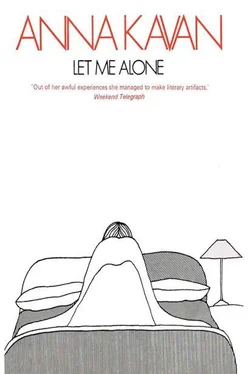Just for a moment, she struggled wildly to defend herself. But when she felt his strength, the tough, monkeyish strength of his long arms about her, she knew she had no chance against him. She had to submit. But he was ugly to her, horrible. Never for one instant did her spirit yield to him. Her will, her soul, was set in inflexible, adamantine resistance, defying him. He was hateful to her, despicable, so that she cringed under the humiliating infliction of his body, his hard, smooth, unattractive muscularity. But she submitted to him, to his ugliness and to his strength, his imperceptiveness. And he ravished her. He simply took her body and ravished it. She suffered atrociously. Yet all the time her spirit remained cold, reckless, and unchanging. Nor did he ever become real to her.
AFTER Colombo there still remained five days of sea before the Henzada would reach Rangoon. But the heart seemed to have gone out of the ship, this part of the voyage hardly counted. All the more noticeable passengers — the smartest, the most interesting, the most amusing — had left the boat at Colombo. The people stopping on board were the callow young bachelors fresh from unimportant schools and training colleges, the untidy families of young children with their tired-looking parents, the insignificant elderly couples, like the Bretts. The same convention of jovial gaiety was maintained; but now it was the gaiety of the nursery. The whole tone of the ship had descended to a rather tiresome domesticity. And there was an undercurrent of discontent. Superficially, these people might be all keenness and enthusiasm. But underneath was a certain reluctance — rather the feeling of schoolboys at the start of a new term.
With a complete indifference Anna watched the monotonous last days of sea. She saw a shadowy line, far out in the midst of the blue vacancy, running along the edge of the sky. She knew that it was the coast of Burma.
And slowly the land approached — they came to the mouth of the river and steamed up, slowly, so slowly, in the sluggish afternoon. Soon they would be in Rangoon. Anna was too indifferent to care. A vast indifference had settled on her like a doom. She went about calm and vague and indifferent. Vaguely, she was sorry that Findlay had gone. Vaguely, she was aware of a sense of humiliation, of bitter loneliness: the absolute loneliness of her existence. She felt weighed down by an oppressive rock of indifference. And Matthew was the cause of her humiliation. Vaguely, she wanted to escape from him, but she was too indifferent to make any effort.
In front of her she could see Matthew’s head, with its dark, dry-looking hair, inclined to dustiness, like a cap that has not been brushed. It was his head, she imagined, which so oppressed her, crushing her in some way, as a weight might crush the blood out of her heart. He was very complacent after his triumph over her. And back to his chivalrous pose again. He was very devoted and attentive, looking at her with a proud gleam of private ownership in his manly eye, making no advances for the moment. But he was getting tired of chivalry and restraint, she could see. Soon he would start bullying again.
The passengers got excited, packing and saying good-bye, and so the boat steamed on till it came to Rangoon. Then there was a fuss and a scramble with servants and luggage, a confusion of meetings and farewells, and finally a drive in an open car to the station. Anna was vaguely disappointed. Rangoon was a big town with modern buildings and trams everywhere. Without the brown faces and the brilliant clothes, it might have been Marseilles over again. She sat and ate in the station restaurant while Matthew fussed over the luggage.
Towards evening they were in the train, in a queer white wooden box of a carriage, travelling up the middle of Burma. In a trance of indifference Anna watched the flat, unreal-seeming country outside the windows, the squalid, ramshackle bamboo huts and the gaudily dressed crowds. Then it was dark, the train running on in the black night, worlds away from everywhere it seemed. The familiar universe had vanished away, and in its place had come this strange black void, and the train thumping on for ever and ever, nothing but darkness and the heavily throbbing train. Only at the infrequent stations there was light and noise, a flare of hot, reddish lights, and the hubbub of seething humanity, a sharp, breath-taking odour of hot foods.
The slow discomfort of the night proceeded. It grew rather cold. Matthew was sound asleep. The train rumbled on; or came to an occasional halt. Anna saw glimpses of stations, still crowded, but quieter now, with strange, cocoon-like figures lying on the ground. Occasionally she caught sight of names — Pegu, Prome. What in the world could they stand for but stations, weird, spectral platforms brightly lighted in the profound black night, and rows of muffled figures outstretched?
At last it was morning. The sky filled slowly with a ghostly pallor. Drop by drop the greyish-luminous light distilled into the great, smooth cup of the sky. Then came the pinkness of dawn, and the golden sun swinging up, suddenly, as if surprised, out of the level land. Anna was pleased. In the midst of her weariness and indifference, she felt a shaft of appreciation. Suddenly, she was pleased to be in the East. It pleased her to watch the queer, flat, unearthly-looking country, the people pleased her, the brown, rather flat-faced people with their brilliant skirts and the flowers in their hair.
After a time the hills appeared. The train panted up, slowly, laboriously. They seemed to be among the tops of the hills. Dazzling little pagodas perched on the rocky summits, hills swelled up and down, like a tapestry landscape, pools of water sprinkled with bright blue lilies trembled in the low places; it all seemed brilliant and gay, rather childish, like a fairy-tale country come alive. The train pottered along, and stopped more often. Finally it left the hills and meandered out on to the level ground.
They were going back to Matthew’s old district. He put on his hat and leaned out of the window expectantly. There was a station and a hideous water-tank in the midst of the plain that flowed up to the feet of the hills like a lake. The train stopped. This was their destination.
Anna stood at the carriage door, looking out at the inevitable station crowd of lively, high-coloured figures. It was late afternoon. Matthew was expecting to be met by Jonsen, the man he was to relieve, but Jonsen was not visible. So Matthew stepped down among the crowd and went to look for him, leaving Anna to wait. The people stared at her and made remarks in their quick, gulping, guttural language which seemed to be all monosyllables. She rather liked the look of them; their clear, round, moonish faces, their good-natured, slightly cheeky appearance. Back came Matthew, looking annoyed, and followed by two men, natives of India, with much darker, almost purple skins, and large metal badges worn on a sort of sash over one shoulder.
‘Here are the chuprassies, but Jonsen hasn’t turned up,’ said Matthew. ‘It’s really too bad of him.’ He scowled in his irritable, ineffectual style. Things were going wrong, as usual. The inevitable hitch had occurred.
Anna got down on to the platform. The chuprassies climbed into the carriage and fetched out the luggage. The train went on. Matthew and Anna went out to the back of the station, the chuprassies pushing a way for them with the hand-luggage through the crowd. Here was a nondescript space of trampled ground, with people waiting, and a row of bullock-carts. The luggage was deposited in a pile on the dusty earth. Off went Matthew, and disappeared once more, leaving Anna beside the luggage. She waited, feeling abandoned. The bullocks rolled great eyes of apprehension at her.
Читать дальше












